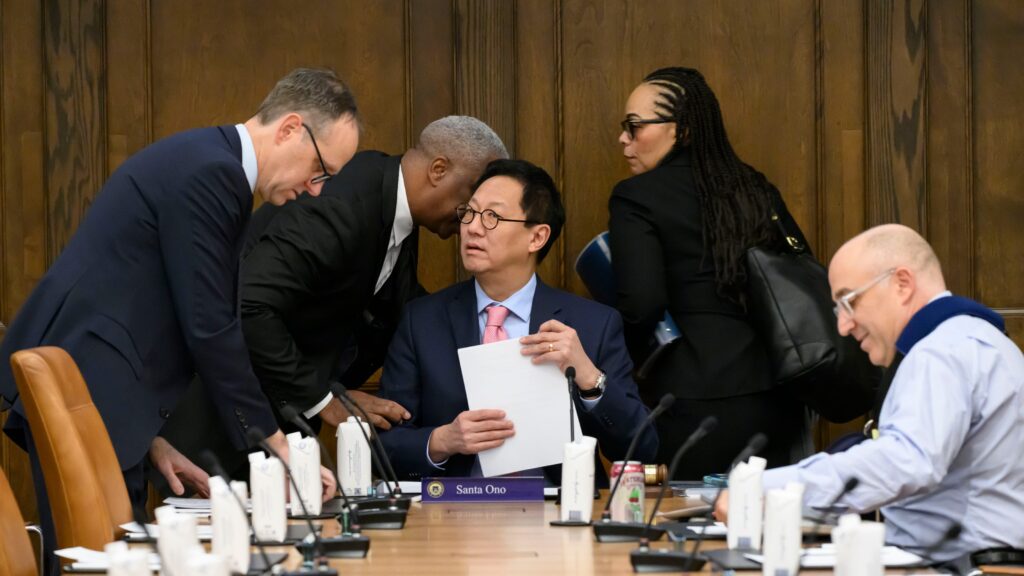The University of Michigan, like all colleges and universities, is facing enormous challenges as it works to navigate executive orders issued during the first few weeks of a new presidential administration, President Santa Ono said Thursday.
“The implications of many of these measures are unclear and will likely depend on how they are interpreted and applied, both by agencies and, ultimately, the courts,” Ono said told the board of regents during its monthly meeting.
“This is a critical moment for higher education,” Ono added.
More:Nessel sues to block Trump’s cuts in payments to Michigan universities for research support
Since Republican President Donald Trump’s inauguration last month, he has issued executive orders that Ono called a “remarkable period of change.”
Following the Feb. 7 National Institutes of Health directive that all future and current research grants will be subject to a 15% cap on indirect costs, Ono said he worked with partners to mobilize a coalition of 22 attorney generals — including Michigan Attorney General Dana Nessel, a Democrat who co-led the lawsuit — to fight the cap.
“We succeeded in winning a critical, but temporary, restraining order,” Ono said. “The NIH directive and other federal guidance carry significant financial implications.”

Ono said “given the recent challenge to indirect costs, I’ve taken the step of asking my team to conduct a careful analysis of these indirect cost reimbursements to ensure we are providing the maximum return on investment for the state of Michigan and the nation.”
The NIH said the 15% cap would save taxpayers $4 billion a year overall.
“The United States should have the best medical research in the world,” NIH wrote in its announcement. “It is accordingly vital to ensure that as many funds as possible go towards direct scientific research costs rather than administrative overhead.”
More explanation is needed to show what is at risk, said Regent Mark Bernstein, a Democrat.
“We should explain how NIH funding has created the infrastructure that leads to discovery, employment, economic development and most importantly, saves lives,” said Bernstein, vice chair of the board.
A cure for cancer, diabetes, Lou Gehrig’s disease and Alzheimer’s disease will happen at UM or one of America’s research universities, he said.
“This is not time to be fearful,” Bernstein said. “Many institutions are saying, ‘Don’t rock the boat.’ But the boat is sinking. This is a storm that will not blow over while we take cover. Amazingly, tragically, sadly the federal government wants to take this away from us and when it’s gone it could be gone forever.”
“It took literally centuries to build these institutions and the capacity to engage in this life-saving research and scholarship,” he continued. “If we don’t fight, our government will take this all away from us … the patients and families who benefit from these life saving treatments and technologies.”
Critics have argued that taxpayers shouldn’t have to pay for such research overhead expenses. NIH in a post on X said it was lowering the maximum indirect cost rate that research institutions may charge the government to 15%, which NIH said is above what many major foundations allow and “much lower than the 60%+ that some institutions charge the government today.”
UM’s chief financial officer and his team are carefully tracking changes and modeling a variety of potential outcomes, Ono said.
“We are fortunate to maintain a strong financial position, and we are taking steps to be as prepared as possible to respond wisely and quickly to any financial impacts that may lie ahead,” Ono said.
UM’s president said he is working on numerous fronts, in his roles as a board member and chair of the Council of Presidents at the Association of Public and Land-grant Universities; as a board member of the American Council on Education and member of the Association of American Universities, to “guide our sector.”
“I have been in near constant communication with presidents from other universities to craft a sector-wide strategy to engage constructively with the federal government,” Ono said. “Though we are navigating many changes, I want to make one thing very clear: The university will remain steadfast in its commitment to academic freedom, freedom of speech and freedom of expression.”
kkozlowski@detroitnews.com

